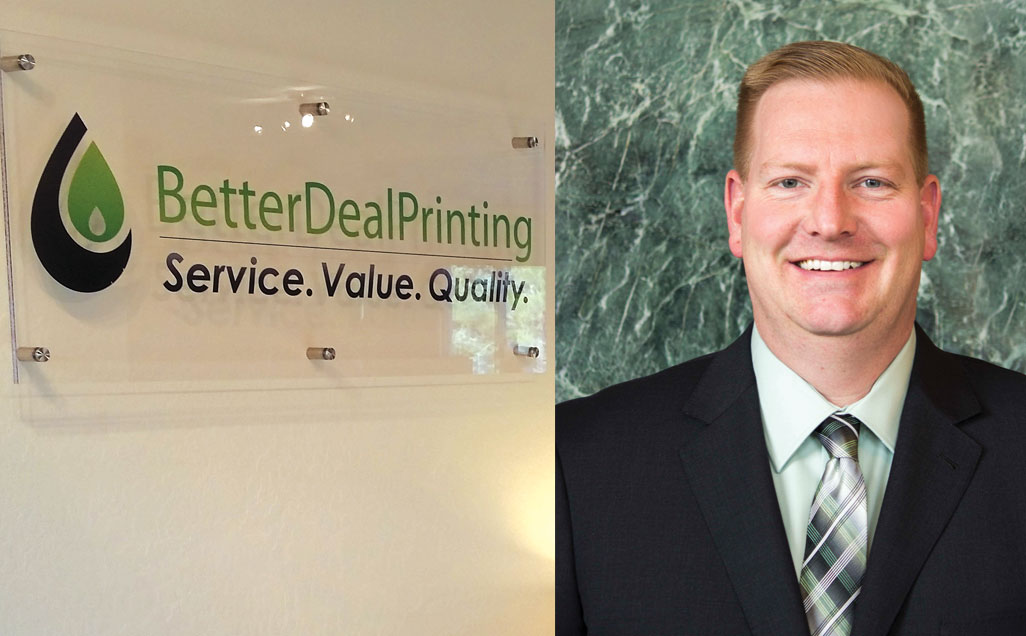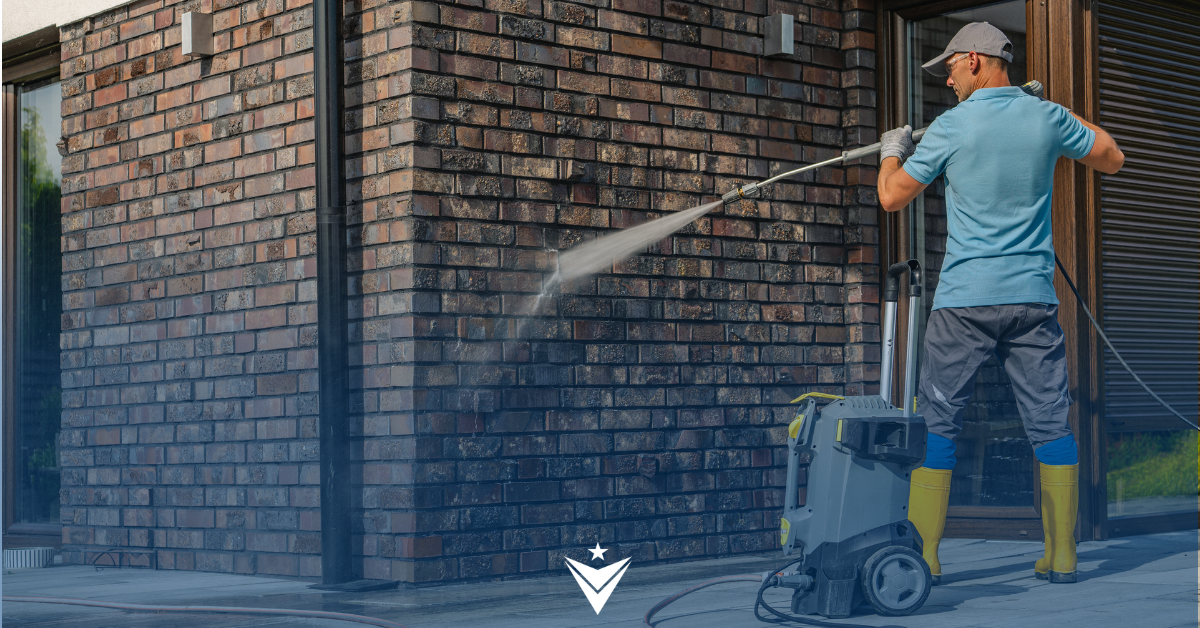Larry Curell has always relied on a pragmatic, solution-oriented approach to his life that enables him to see opportunities where others only see problems. Curell successfully grew his business, Better Deal Printing, to the point where he needed to franchise to grow sustainably. His dedication to hiring veterans as both employees as well as franchisees has earned him the honor of NaVOBA’s 2017 Franchise Vetrepreneur® of the Year.
Bumps in the Road
After enlisting when he was 17, Curell got his first big disappointment.
“I had been in the Air Force ROTC in high school and had always wanted to be a military pilot. But when I signed up for the Air Force, I found out my eyesight wasn’t good enough,” explained Curell. “So, I decided if I couldn’t fly planes, I would jump out of them instead.”
Fueled by tenacity and a thirst for adventure, Curell served as a paratrooper in the Army Special Operations Command for the next several years, retiring in ’97 from active duty after injuries in ’93 and ’95 left him with service-connected disabilities.
While an adrenaline junkie like Curell might seem an unlikely candidate to end up the owner of a printing company, Better Deal Printing is merely the vehicle for success that Curell chose to capitalize on. And capitalize he did. After entering the print products market in 2001, Curell has built BDP from a little side business run out of his garage to a dynamic, large-scale operation with a huge number of product lines and long list of large corporate clients.
To boot, BDP isn’t your run-of-the-mill sign-printing company. It’s a dynamic, flexible organization with a relentless focus on creating high-value print solutions that constantly look to stay ahead of customers’ needs. It’s such a successful business model, in fact, that it now offers franchise opportunities.
Planting the Seed
After retiring from active duty, Curell worked for Motorola testing technology for the company’s tactical radar system, so he wasn’t even looking for work when he first started BDP. It all started one day in 2001. After growing annoyed that runners for a local printing company kept crossing his newly planted grass to hang advertisements on his door, Curell approached the workers one day to ask them to use the walkway instead. A conversation ensued, and Curell discovered the men were grossly underpaid and overworked. And that’s when he had his lightbulb moment.
“I figured I could create the door hangers myself, sell the ads for less, and pay the workers more, and still make a profit, explains Curell. “My wife is a graphic designer, so I sold the ads, she did the design, and we outsourced the printing.”
The job took all of a single weekend, and by the end of it, they had made $7,000. That’s when he and his wife realized this was a real business opportunity, so they continued to create and sell similar types of advertising opportunities as their side hustle, working out of their master bedroom. Curell dubbed the venture Better Deal Advertising (the ill-fated door hanger company Curell outcompeted had been called Good Deal Advertising).
“When we started out, we traded and bartered with customers and outsourced the printing jobs. We eventually bought a printer, then upgraded to new and better machines as we could afford to. We met all kinds of print needs, sold ads, did direct mail, door-to door – all that stuff. Then, in 2007, I moved to Prescott, got rid of the door-to-door piece.”
Steady Wins the Race
Over time, Curell continued this steady, organic growth, and to hear him tell it, he simply saw opportunities in the print industry and went after them. He changed the name of the company in 2009 to better reflect the organization’s products and services. In 2011, Curell added a large format division to meet his customers’ signage needs, followed by screen printing and embroidery in 2013.
The company does nearly all of its own manufacturing, with the exception of its promotional products division, which it also added in 2013. Curell explains that BDP uses manufacturing partners so they can still offer branded goods, which have become increasingly popular in recent years, to their customers. Simply put, BDP has become a one-stop shop for all the print marketing needs of its clients.
“A few years ago, we realized that in order to continue grow, we needed to either kill the competition by slashing our prices—which isn’t sustainable—or we needed to franchise,” says Curell. “So, we did a feasibility study and realized it was a viable opportunity.”
Branching Out
BDP began offering franchising opportunities in 2015, with a focus on appealing to those who have the drive and determination to succeed, but may not have deep pockets. The relatively affordable buy-in of $25,000 and a lower-than-average royalty fee structure makes a BDP franchise accessible to a wider range of entrepreneurs. And while Curell says the opportunity is open to anyone, he hopes to attract as many veterans as he can so they can achieve the same success he has.
“The great things about this opportunity are that you’re not limited to any geographical area and you don’t even need a brick-and-mortar shop,” says Curell. “You can meet the needs of your customers by working from home and brokering everything. You can make as little or as much as you want—you get out of it what you put into it.”
What Curell means is that franchisees can do exactly what he did when he first founded BDP—except that there’s no need to reinvent the wheel. BDP maintains a list of printing companies around the country, tapping the print shops for quick turnaround print products it sells to local companies in that particular printing shop’s area. This way, orders can printed and delivered in as little as a day, even if a BDP customer lives in New York, far from BDP’s Arizona headquarters.
Powerful Partnerships
“We already have a list of approved sources that we’ve vetted for product and service quality, and we have agreements with those shops that they’ll provide their wholesale prices to our franchisees as well. When franchisees need to place orders, they can go through our corporate headquarters or their local suppliers, though I encourage them to use local suppliers in order to build those relationships.”
As the franchisees grow, they can choose to buy their own equipment and open brick-and-mortar locations, but it isn’t required. What IS required is that franchisees work hard to grow their businesses, be good stewards of the brand, and ensure they are consistently meeting their customers’ needs.
“In terms of support, you get brand recognition and mentoring. Working with me, they learn step-by-step how to identify opportunities, sell the products, and build their businesses,” says Curell of the franchising
opportunity.
Relationship Management
There are no minimum targets franchisees are required to hit, though Curell says he encourages the franchisees try to do at least $1,000 a day in sales. In general, though, he says he wants his franchisees focusing more on meeting his customers’ needs than on hitting cash targets.
“We ask that they focus on relationships more than the dollars,” Curell explains. “We treat our customers like family, and that’s why we want to have local BDPs around the country, so that you can focus on your customers, meet with them face-to-face, and solve problems on the fly.”
The customer-centric approach seems to be working quite well. Today, Better Deal Printing, a verified service-disabled veteran-owned small business (SDVOSB), has a wide range of customers, from local businesses to government clients such as the Veterans Administration to corporate giants like AT&T. It has won several awards, recently made Entrepreneur’s 2017 Franchise 500 list, and currently has customers in over 20 countries on four continents.
Sweat Equity
Curell requires his franchisees to donate up to 2-percent of profits to nonprofits each year. And while there are a number of ways BDP gives back to its local community, such as making free uniforms for local sports leagues, Curell’s not afraid to put his money where his mouth is. To that end, Curell says he plans to roll out a program that will waive the entire franchise fee to qualified veterans, giving away up to five free franchises to vets and/or service-disabled vets.
“As a service-disabled vet, I know how hard it can be to find a job and support your family, especially when you’re trying to get to therapy appointments. I’m lucky I could rely on organizations like SCORE and get help from a vocational rehabilitation program through the VA, which also enabled me to go back to school.”
Vets interested in “winning” a franchise should contact Curell at BDP or visit www.bdpfranchising.com.
“You won’t need to invest the franchise fee, but you will need to earn it through the sweat equity you put into your business,” explains Curell. “Succeeding at this business is definitely doable, but you have to be disciplined and motivated to succeed.”






